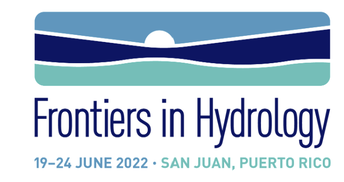 Sylvain Kuppel and I are inviting our colleagues to a workshop on "Connecting Water Ages and Biogeochemical Processes in Critical Zone Studies" at AGU's Frontiers in Hydrology Meeting 2022 in San Juan, Puerto Rico. We aim to bring scientists from different Earth Science background together to exchange ideas on how to improve hydrological studies on water ages to biogeochemical studies on nutrient or contamination transport. The workshop will take place on the afternoon of Sunday, June 19th and we will invite some panelists to give brief introductory presentations. Most of the 2 hours are planned for discussion in small groups.
0 Comments
We are preparing again a session for the AGU Fall Meeting 2021 on "Stable Isotopes in the Critical Zone: Methods, Applications, and Process Interpretations". Please submit your abstract before August 4th here. This year, the conference will take place in hybrid mode and one can access virtually or take part on side in New Orleans. The convener team will be Natalie Orlowoski, Scott Allen, und Elizabeth Olson. We are all looking forward to hear about your research and exchange ideas and findings.
Also at this year's AGU Fall Meeting, we will offer a session on "Stable Isotopes in the Critical Zone: Methods, Applications, and Process Interpretations". The last years, the session was very well attended and had lots of interesting isotope research to offer. Make sure to submit your abstract by the End of July here. The AGU Fall Meeting will be held virtually this year and you can read all about it here. This said, you will be able to attend without the usual high costs of travelling and accommodation. Further, the conference fee will be about half the usual price, due to the online form. So, it'll be a great way to keep contact with each other, despite the difficulties during the Covid crisis. You can read here about experiences some hydrologists made during the EGU General Assembly that was held as a virtual conference. I hope to see many of you again for our isotope session!
Thanks to the support and organization by the Wassernetzwerk Baden-Württemberg, we had four full days of intensive classes and discussions with twenty graduate students and postdocs from around the world in the Black Forest on the topic of "Water Ages in the Hydrological Cylce". The classes covered current methods ranging from Ensemble Hydrograph Separation, Endmember Splitting Analysis, Age tracking in catchment-scale hydrological models, StorAge Selection functions, and process based modeling approaches. Classes were accompanied by hands-on tutorials and in between, there was time for discussion about water age concepts, tracer hydrology, and sampling strategies.
We are organizing an exciting workshop on studies using stable isotopes to better understand soil-plant interactions. It will take place in Hannover, Germany from 22-24 July, 2020. See info below or reach out to me in case of questions. There will be reduced registration costs for early career scientists. The workshop will be a mixture of oral and poster presentations with smaller group discussions and co-organized with support from EGU Galileo Conferences and the Volkswagenstiftung.
We offer in 2019 for the third time a session on "Stable Isotopes in the Critical Zone: Methods, Applications, and Process Interpretations" at the AGU Fall Meeting. This year our convener team will be composed by Stephen P. Good, Natalie Orlowski and Scott T. Allen. Abstract submission is open from June 12th to July 31st.
Session description: Stable isotopes are powerful tools for tracing fluxes of water, carbon, and nutrients. They are increasingly used in various disciplines to better understand processes occurring in the soil-plant-atmosphere continuum. Furthermore, new methodological and technological developments have facilitated tracing isotopes at much finer scales, but also across larger domains. By enabling the tracing of exchanges across distinct landscape pools, stable isotopes support new interdisciplinary perspectives on critical zone processes. This session aims to address the current state of the art for methods, applications, and process interpretations using stable isotopes in the critical zone. Studies that cross disciplinary boundaries and reveal new process understanding are especially welcome. This session also encourages contributions that celebrate the AGU's Centennial, including reviews of historical data and the evolution of stable isotope tools within the critical zone, as well contributions that discuss the future direction and needs of the critical zone stable isotope community. We are inviting applications for the new Black Forest Autumn School on "Water Ages in the Hydrological Cycle", which will be held at from October 27 to 31 in Freudenstadt, Germany. The Black Forest Autumn School will teach approaches,
methods and models to determine water fractions, water ages and transit times throughout the hydrological cycle and will foster inter-disciplinary discussions. Lectures and hands-on exercises including a small model intercomparison project will provide a stimulating learning environment. The lecturer team consists of Markus Weiler, Christine Stumpp, James Kirchner, Markus Hrachowitz, Paolo Benettin and me. The Autumn School is supported by the Water Research Network Baden-Württemberg. The course fee is 290 €, but free participation for young scientists from Baden-Württemberg. If you would like to attend, send a 1 page motivation letter and your CV to [email protected] by July 15 2019. More info on this flyer. There will be an interesting session on "Water, isotope and solute fluxes in the soil-plant-atmosphere interface: Investigations from the canopy to the root zone" at this year's EGU General Assembly in Vienna. There are lots of exciting studies in the program contributing to
a poster session on Friday, 12 Apr, 10:45-12:30 and two oral slots Friday, 12 Apr, 14:00-18:00, Room 2.25! Make sure to arrange your travel plans to enable your participation on the last conference day! The session's description: During the passage of precipitation through the soil-plant-atmosphere interface, water and solutes are redistributed by the plant canopy, subsurface flow and transport processes. Many of these dynamic interactions between vegetation and soil are not yet well understood. This session brings together the vibrant community addressing a better understanding of ecohydrological processes taking place between the canopy and the root zone. Innovative methods investigating throughfall, stemflow, hydraulic redistribution, and root water uptake in various environments shed light on how water and solutes are routed in the thin layer covering the terrestrial ecosystems. The session further covers open questions and new opportunities within the ecohydrological community regarding methodological developments such as the analysis of stable isotope, soil moisture, throughfall or solute dynamics. Invited speakers: Daniele Penna (University of Florence, Italy) Darryl Carlyle-Moses (Thompson Rivers University, Canada) I am looking forward to attending Fall Meeting of the American Geophysical Union held this year in Washington D.C. It is always a great way to learn about latest research developments, get to know and meet again interesting people.
I will open the oral session on Hydrochronology: Advances in Tracer Methods and Modeling of Residence Times in Hydrology (H11G) on Monday morning at 8:00 am. The talk on "Towards improved travel time estimates that account for interfaces in the hydrological cycle" will present thoughts and ideas initiated during a Workshop on Water Ages in the Hydrological Cylce held in October 2018. We are currently preparing a review article and I will use the opportunity at AGU to show the current state of our effort to bring together challanges and opportunities for travel time analysis in critical zone science. I will further chair together with Natalie Orlowski, Todd Dawson, and Stephen Good the oral (H22H) and poster session (H22P) on Stable Isotopes in the Critical Zone: Methods, Applications, and Process Interpretations on Tuesday morning and afternoon. I am also involved in Theresa Blume's invited talk on The value of long-term observations for hydrological event response analysis (H11C-07). She will present methods and data we applied and gathered within the CAOS project, in which I was working during my PhD studies.
We are organizing again a session on "Stable isotopes to study water and nutrient dynamics in the soil-plant-atmosphere continuum" for the European Geoscience Union General Assembly. It will be the third year that we invite abstracts to this topic and we are looking forward to hear about the recent developments in the field of stable isotope applications in soil plant interactions. The session was well-received in the last years with a full room during the interesting talks in our oral session and many inspiring discussions at the posters. We hope to attract once again many scientists and welcome abstract submission until January 10, 2019. https://meetingorganizer.copernicus.org/EGU2019/session/31635
|
Archiv
May 2022
Kategorien
All
|
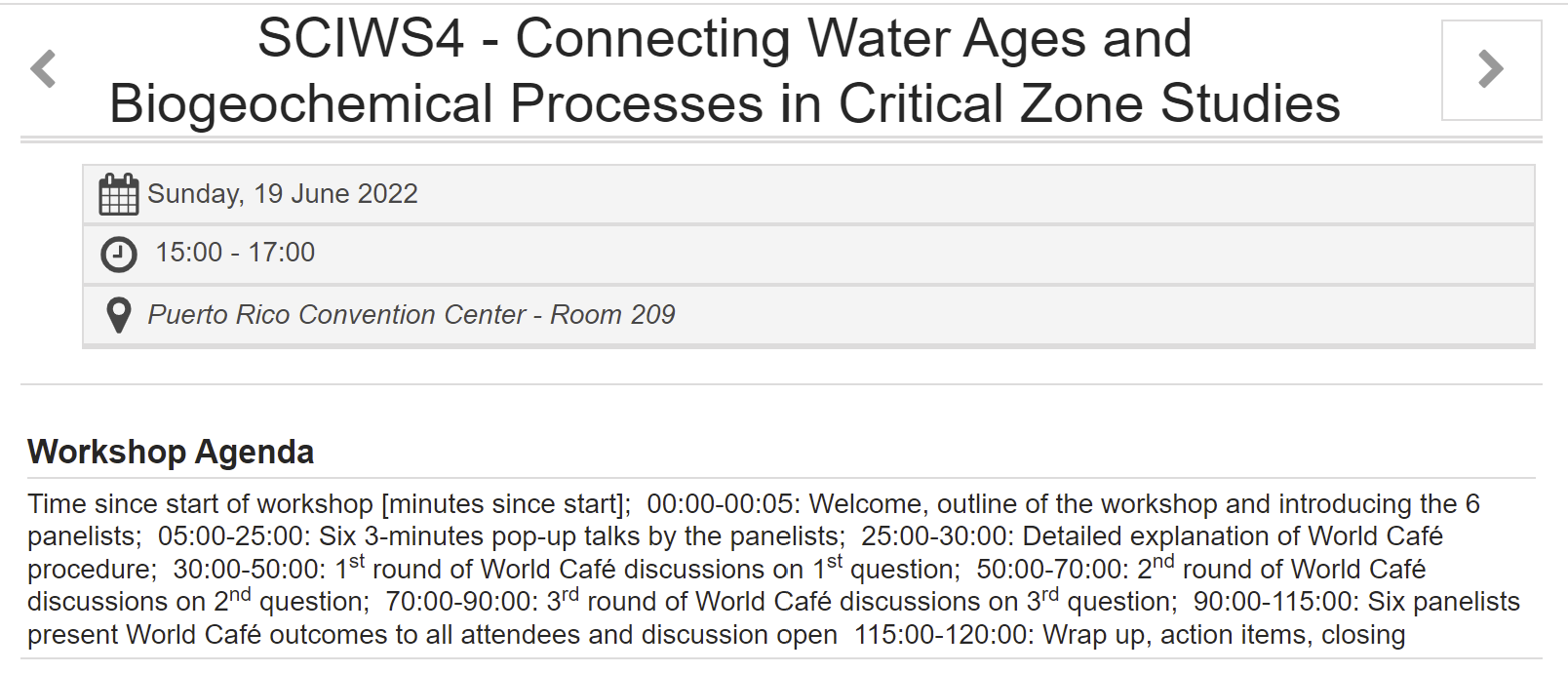
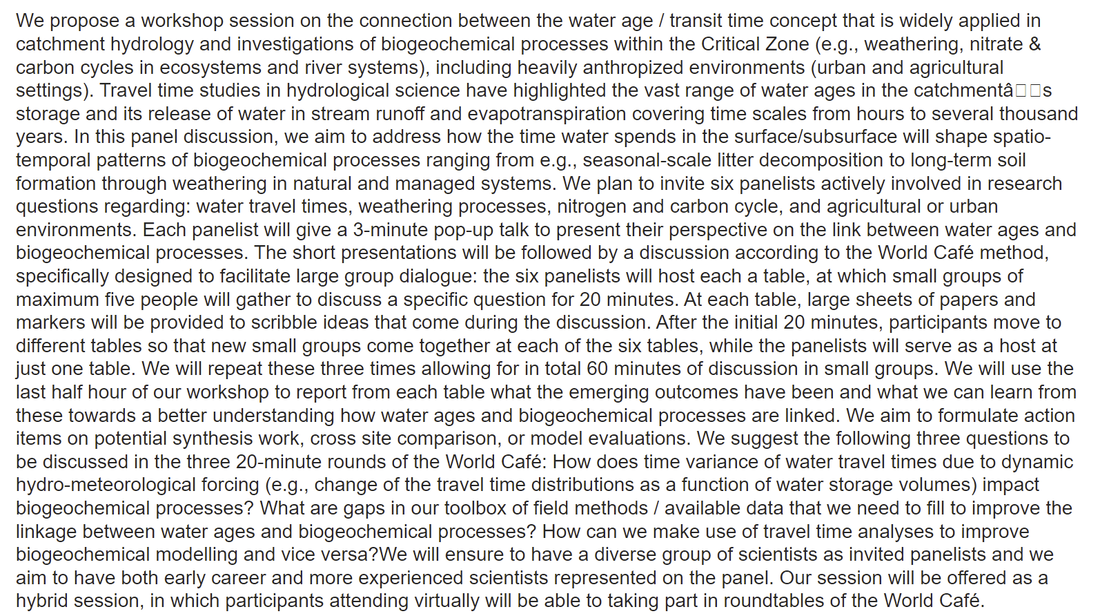
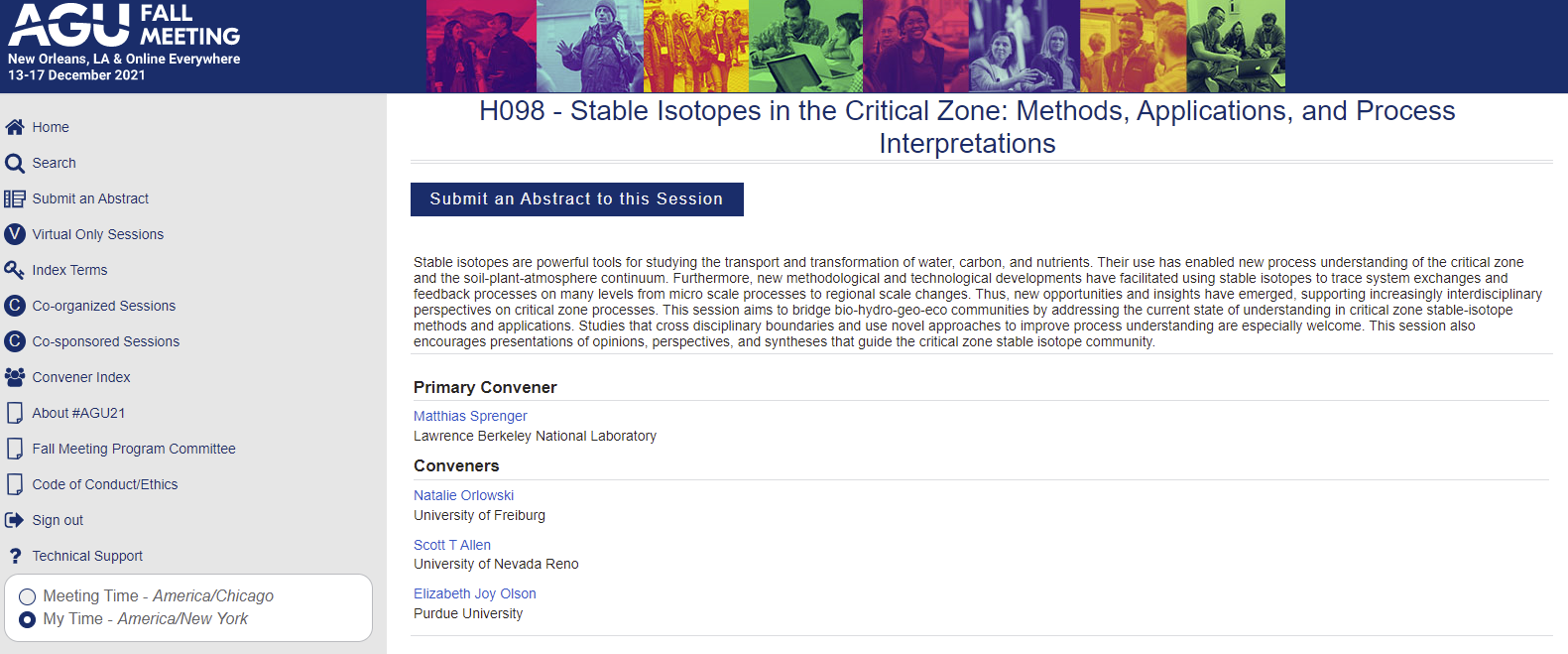
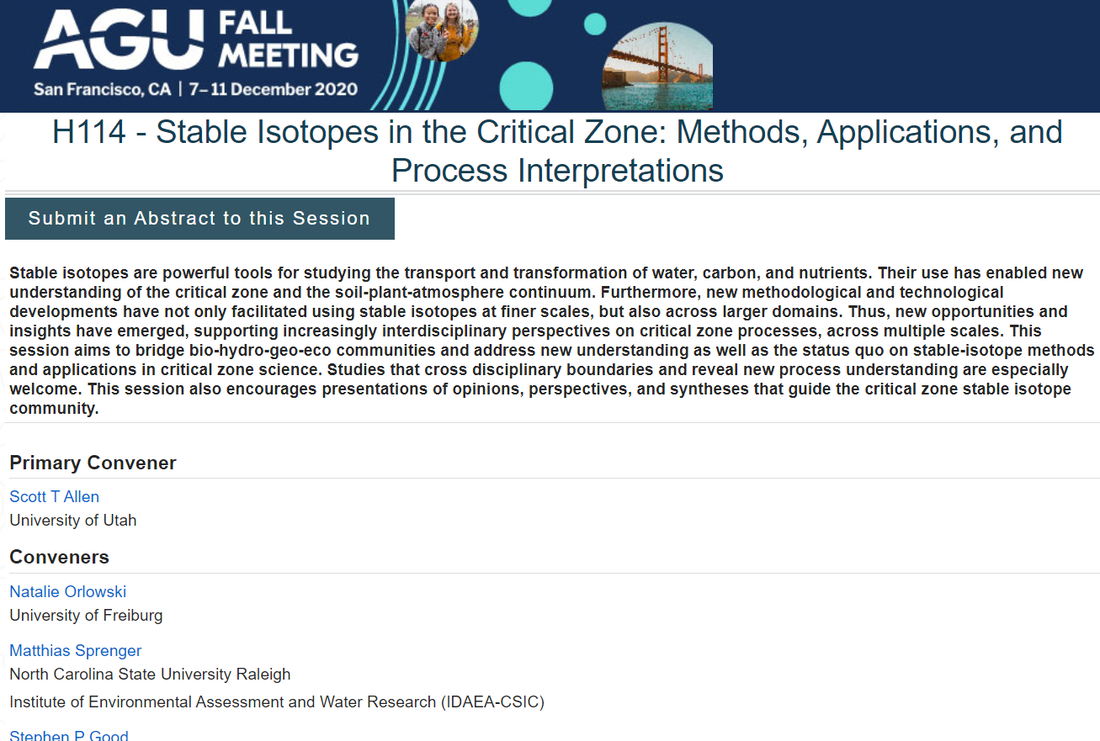
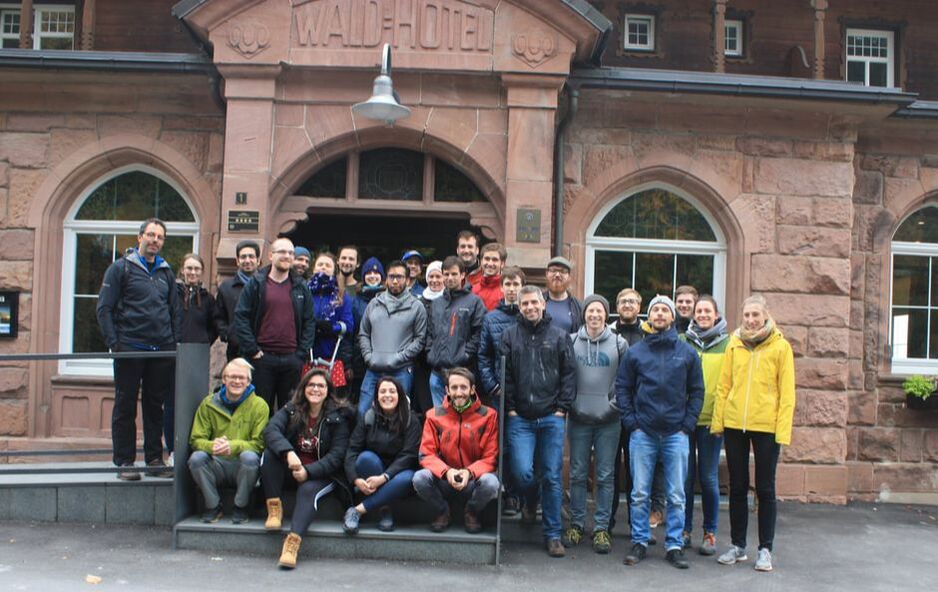
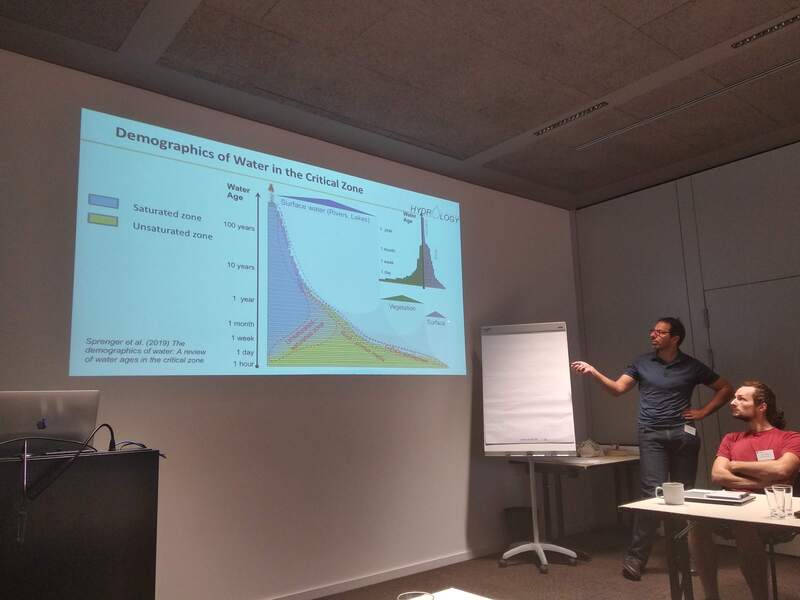
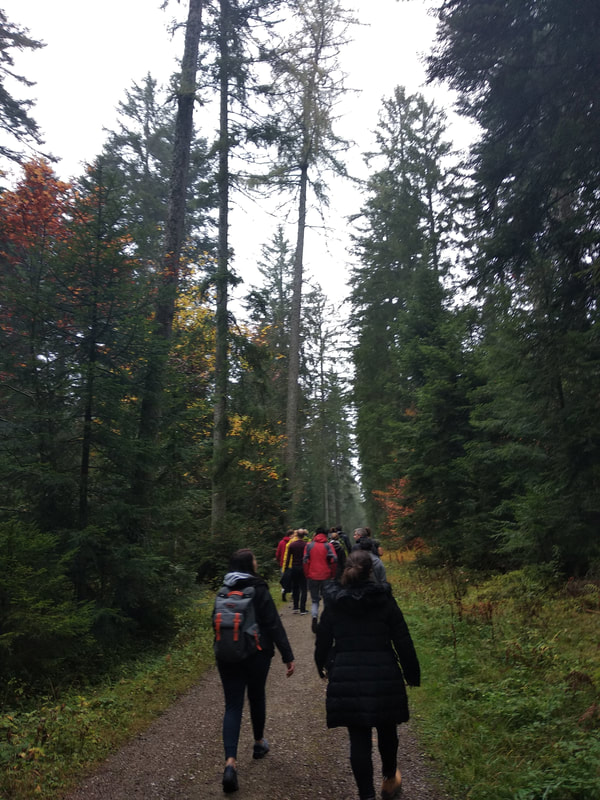
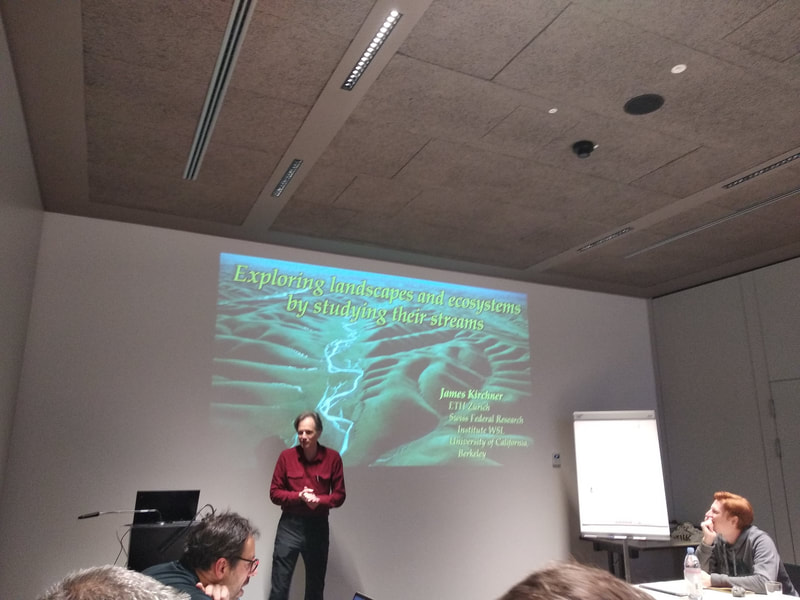
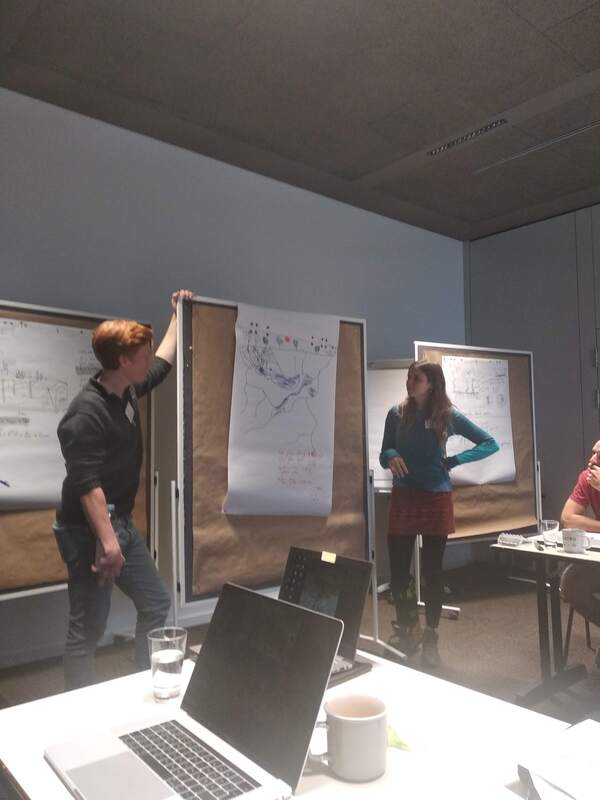
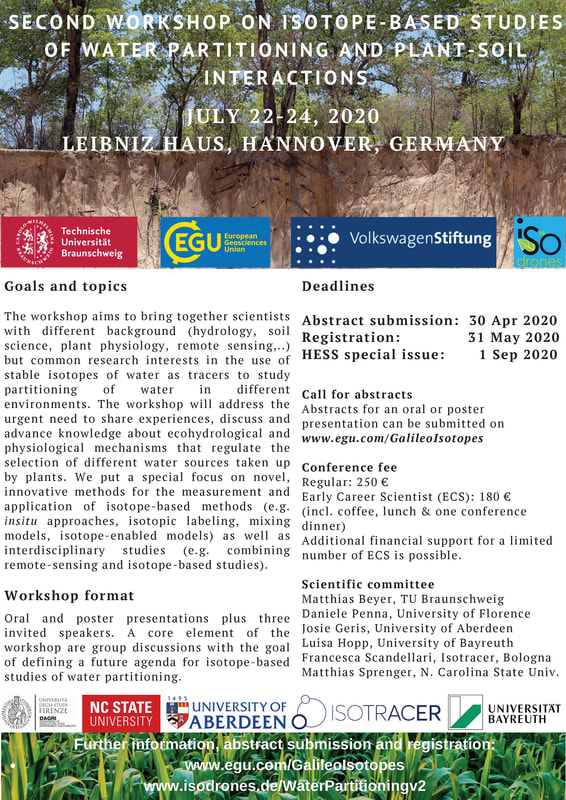
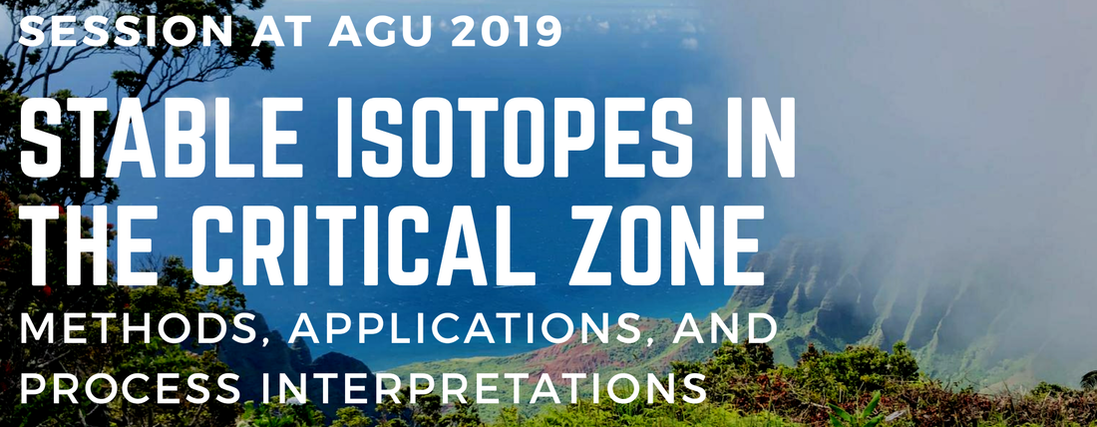
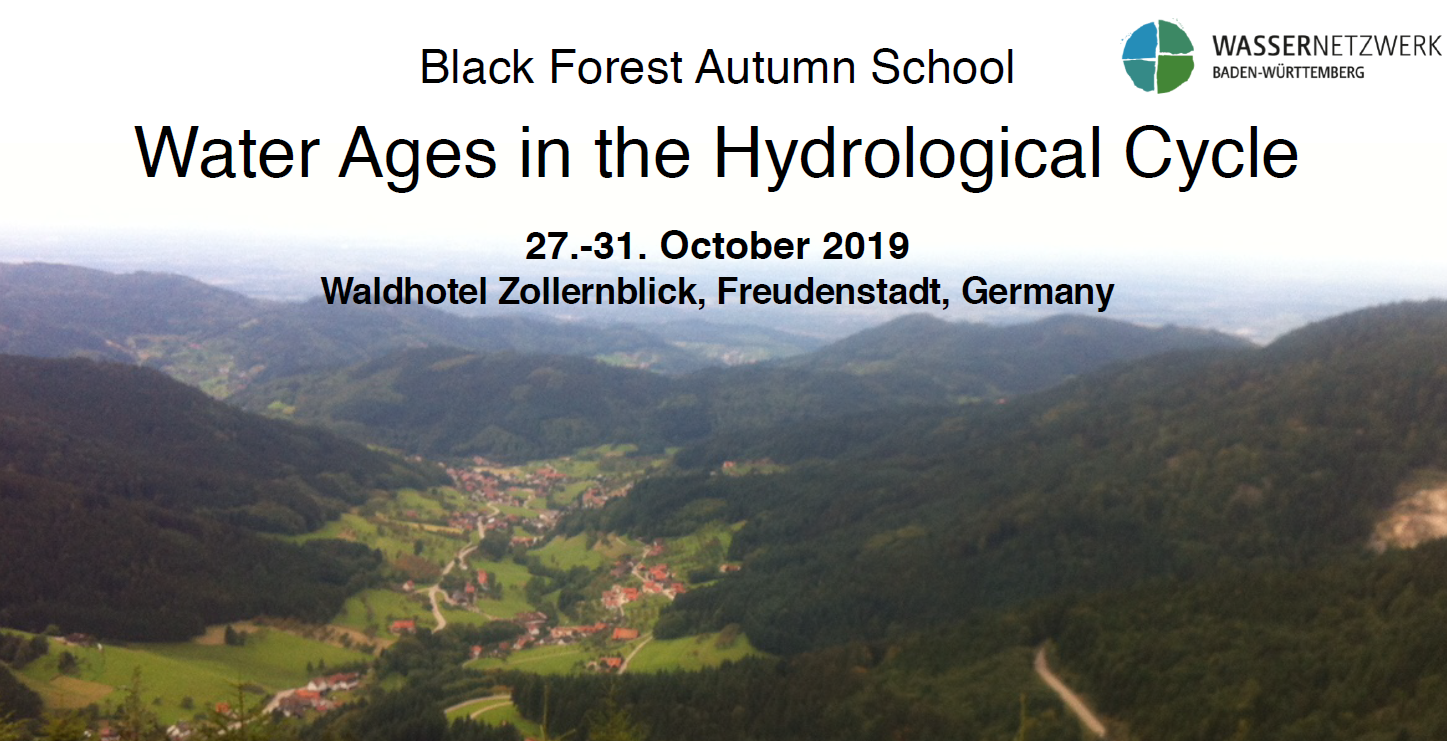
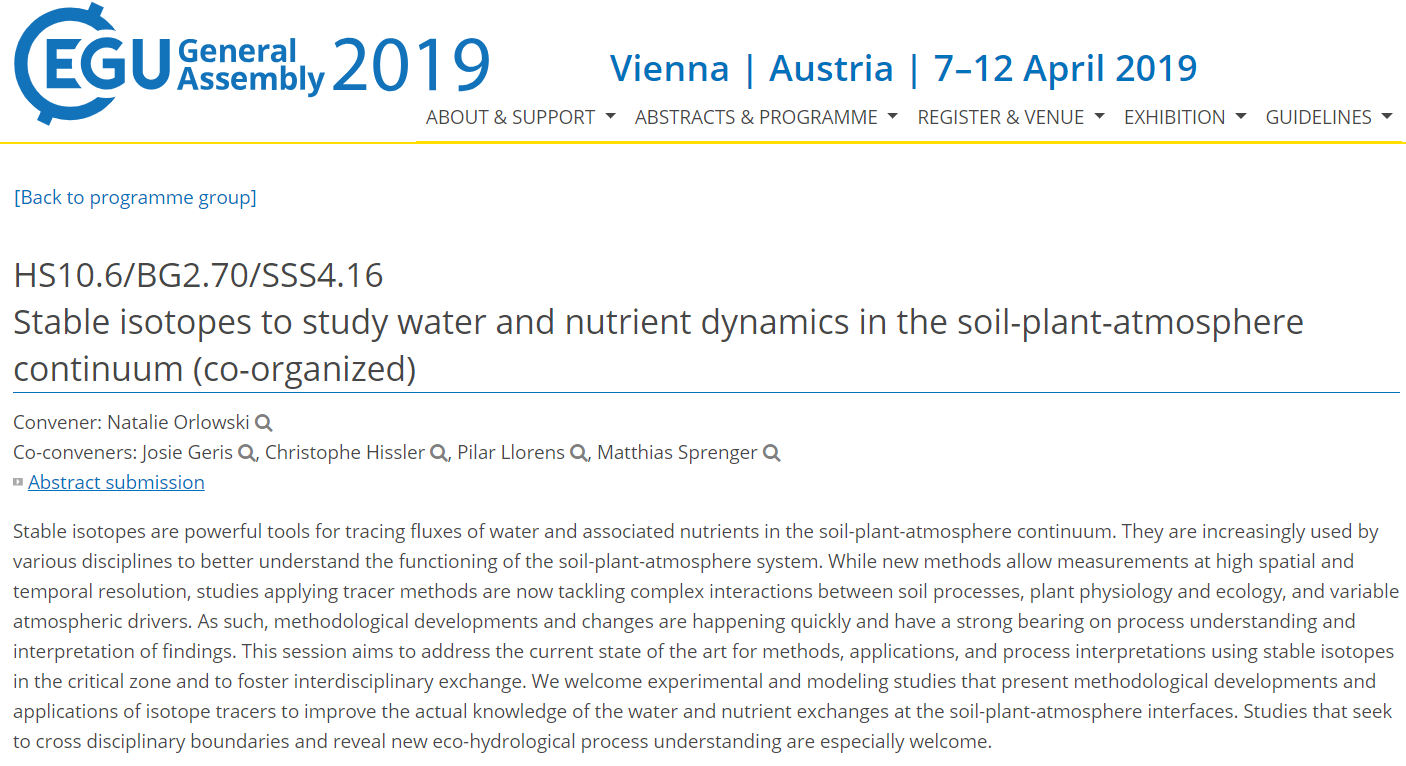
 RSS Feed
RSS Feed
